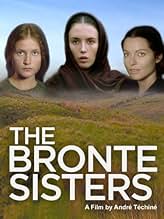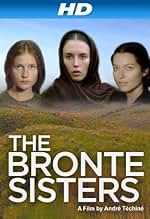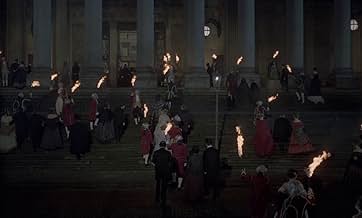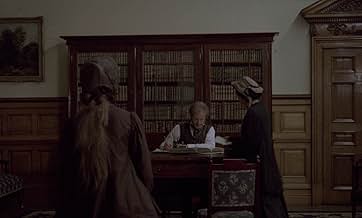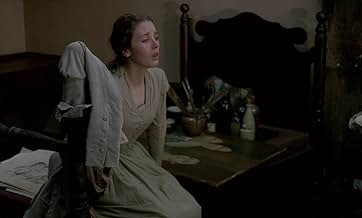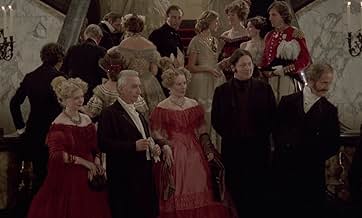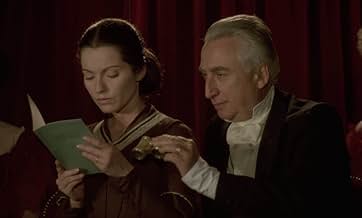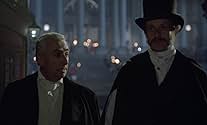Les soeurs Brontë
IMDb RATING
6.4/10
1.3K
YOUR RATING
In a small presbytery in Yorkshire, living under the watchful eyes of their aunt and father, a strict Anglican pastor, the Bronte sisters write their first works and quickly become literary ... Read allIn a small presbytery in Yorkshire, living under the watchful eyes of their aunt and father, a strict Anglican pastor, the Bronte sisters write their first works and quickly become literary sensations.In a small presbytery in Yorkshire, living under the watchful eyes of their aunt and father, a strict Anglican pastor, the Bronte sisters write their first works and quickly become literary sensations.
- Director
- Writers
- Stars
- Awards
- 3 nominations total
- Director
- Writers
- All cast & crew
- Production, box office & more at IMDbPro
Featured reviews
10MEG-40
Although I saw this film in 1979/1980 it was one of the most memorable movies of my movie viewing days. The photography was excellent and is to my mind one of the best alongside 2 or 3 other films that have appealed to my artistic senses. At the time I thought 'trust the French to make a movie about the English that is so beautifully executed'. This may sound very "highbrow" but not really. If you are into foreign language films well acted and visually appealing this is a film for you. I have been searching ever since for a chance to view it again. Top Marks 10/10
Premiered in Cannes and competing for Palme d'Or, Téchiné's elusive biopic about the world- famous British literature siblings met with a cold shoulder from both critics and its audience, its reputation has been reviving through time, a BluRay release is a timely step and gives a full-blown flair to this artistic project.
Starring Pisier, Adjani and Huppert, three distinctly beautiful French actresses as Charlotte, Emily and Anne Brontë respectively, and casting a then unknown Greggory as their brother Branwell, in fact, the film could be more aptly renamed as "BRANWELL BRONTË AND HIS THREE SISTERS", because his story takes a great chunk of the narrative. If one had done some background check beforehand, one would know that three of the four siblings were struck by early death, survived only by Charlotte and their father Reverend Patrick Brontë (played by the Irish veteran Magee), so death foregrounds itself as a sombre motif in the contexts, starting with their aunt Elizabeth (a wayward presence from the singular-looking Sapritch), tragic events ensue and render an elegiac sheen of pathos so astute that it permeates into the bleak surroundings and strikes spectators hard.
From the outlook of a language purist or a British loyalist, a Francophone adaptation is something of a travesty, only caters to Francophiles, which might explain its tepid reception at the first place, but Téchiné's aesthetic technique is so astonishingly eloquent, faithfully depicts the plight of intellectual women in Victorian era and knowingly nitpicks the snobbery of the aristocracy, taps into its locale's unique heath topography aided by breathtaking camera-work from DP Bruno Nuytten (Adjani's then partner), an immediate analogy off the top of my head is Andrea Arnold's outlandish offering of WUTHERING HEIGHTS (2011).
Branwell, the only male heir in the family, is a spoilt child, juggling between poetry and painting, his talent is strangled by a failed affaire du coeur with a married woman Ms. Robinson (Surgère, braves herself to a mismatch with a man much younger and immature than her), Greggory's effete physique, emotionally clingy affectation takes the challenge roundly. But it is the trio of actresses what our hearts hanker after, the two Isabelle, both in the acme of their youth, Ajani's Emily is a hard-bitten dissenter of romance and love, of fame and material trappings, even in her dying days, she draws the line at modern medicine and craves for a natural cure, she is iron-willed and portrayed as an archetype of modern feminism, which also lies the assets of WUTHERING HEIGHTS. Anne, the youngest of them, is dwarfed by her sisters in her work, seems to be a diffident, observant gal, but Huppert embodies herself with somewhat mature sensitivity, which faintly counterbalances her youthfulness.
In all fairness, it is the late Ms. Pisier, whose restrained but deeply affecting presentation of Charlotte, leaves the most memorable print on Téchiné's handsomely manufactured adaptation, meanwhile, the attendant score, an eclectic melange of classical music from Tancredi, Rossini and Schumann, runs fluently and channels the emotional upheaval of the fairly rambling plot, until a tranquil finale where some peace finally can be found under the glossiness of fame and success.
Starring Pisier, Adjani and Huppert, three distinctly beautiful French actresses as Charlotte, Emily and Anne Brontë respectively, and casting a then unknown Greggory as their brother Branwell, in fact, the film could be more aptly renamed as "BRANWELL BRONTË AND HIS THREE SISTERS", because his story takes a great chunk of the narrative. If one had done some background check beforehand, one would know that three of the four siblings were struck by early death, survived only by Charlotte and their father Reverend Patrick Brontë (played by the Irish veteran Magee), so death foregrounds itself as a sombre motif in the contexts, starting with their aunt Elizabeth (a wayward presence from the singular-looking Sapritch), tragic events ensue and render an elegiac sheen of pathos so astute that it permeates into the bleak surroundings and strikes spectators hard.
From the outlook of a language purist or a British loyalist, a Francophone adaptation is something of a travesty, only caters to Francophiles, which might explain its tepid reception at the first place, but Téchiné's aesthetic technique is so astonishingly eloquent, faithfully depicts the plight of intellectual women in Victorian era and knowingly nitpicks the snobbery of the aristocracy, taps into its locale's unique heath topography aided by breathtaking camera-work from DP Bruno Nuytten (Adjani's then partner), an immediate analogy off the top of my head is Andrea Arnold's outlandish offering of WUTHERING HEIGHTS (2011).
Branwell, the only male heir in the family, is a spoilt child, juggling between poetry and painting, his talent is strangled by a failed affaire du coeur with a married woman Ms. Robinson (Surgère, braves herself to a mismatch with a man much younger and immature than her), Greggory's effete physique, emotionally clingy affectation takes the challenge roundly. But it is the trio of actresses what our hearts hanker after, the two Isabelle, both in the acme of their youth, Ajani's Emily is a hard-bitten dissenter of romance and love, of fame and material trappings, even in her dying days, she draws the line at modern medicine and craves for a natural cure, she is iron-willed and portrayed as an archetype of modern feminism, which also lies the assets of WUTHERING HEIGHTS. Anne, the youngest of them, is dwarfed by her sisters in her work, seems to be a diffident, observant gal, but Huppert embodies herself with somewhat mature sensitivity, which faintly counterbalances her youthfulness.
In all fairness, it is the late Ms. Pisier, whose restrained but deeply affecting presentation of Charlotte, leaves the most memorable print on Téchiné's handsomely manufactured adaptation, meanwhile, the attendant score, an eclectic melange of classical music from Tancredi, Rossini and Schumann, runs fluently and channels the emotional upheaval of the fairly rambling plot, until a tranquil finale where some peace finally can be found under the glossiness of fame and success.
"Les Soeurs Brontë" is an undeniably handsome production, but also a bleak and shallow film. For at least half its length, it could be re-titled "Branwell & Co.", because he is the main character. But even when the sisters have the film to themselves, Andre Techine and his co-screenwriters have chosen to focus too much on their misery and not enough on their artistic / creative impulses and processes. If you bypass the obvious language discrepancy (at one point, one of the sisters says "we know a little French" - the entire film is in French, of course), the three female leads are well-cast, especially as sisters: Marie-France Pisier (who later became a novelist herself) outshines her two more famous co-stars on this occasion. ** out of 4.
This is the one single wonderful biography about the Brontës!
You feel, it's French: cold, realistic and authentic... Ok, and it seems to be a little boring at the beginning; and there is no one single highlight turing the whole film. But isn't it a magnum opus? I think, exactly this kind of silence gives the film its power. Listen to the words! There is almost no dialogue without a hidden allusion to poems by the Brontë-sisters.
And Isabelle Hupperts' sensitive performance is definitely outstanding.
You feel, it's French: cold, realistic and authentic... Ok, and it seems to be a little boring at the beginning; and there is no one single highlight turing the whole film. But isn't it a magnum opus? I think, exactly this kind of silence gives the film its power. Listen to the words! There is almost no dialogue without a hidden allusion to poems by the Brontë-sisters.
And Isabelle Hupperts' sensitive performance is definitely outstanding.
When the movie was released,it met mixed critical reception.The director seemed more interested in Brother Brontë and the audience was waiting for the sisters ,or should I say the actresses ,Marie -France Pisier (an intellectual thespian) ,Isabelle Huppert ,the rising star and above all ,Adjani the idol of the crowds of the era.
Objections to this costume drama remain:too few of the scenes are really potent,the actresses are too attractive (have you seen portraits of the sisters ? They were not really beauties ),nothing (or almost nothing ) deals with literary creation ,unless some (splendid) pictures of the Moor count.
It's interesting to note that the movie was cut drastically: they say almost an hour is missing .It's hard to judge a truncated version.Maybe some day ,the film as intended by Téchiné will be shown.
Objections to this costume drama remain:too few of the scenes are really potent,the actresses are too attractive (have you seen portraits of the sisters ? They were not really beauties ),nothing (or almost nothing ) deals with literary creation ,unless some (splendid) pictures of the Moor count.
It's interesting to note that the movie was cut drastically: they say almost an hour is missing .It's hard to judge a truncated version.Maybe some day ,the film as intended by Téchiné will be shown.
Did you know
- TriviaOriginal cut runs 180 minutes.
- Quotes
Emily Brontë: I spit on love and all its vanity.
- Alternate versionsSimultaneously shot in two versions (French language and English language) with the same cast.
- ConnectionsVersion of The Brontës of Haworth (1973)
- SoundtracksOuverture de Tancrède (Tancredi)
Music by Gioachino Rossini
Performed by The Academy of St. Martin-in-the-Fields (as Academy of Saint-Martin in the Fields)
Conducted by Neville Marriner
disque Philips
- How long is The Brontë Sisters?Powered by Alexa
Details
- Runtime2 hours
- Sound mix
- Aspect ratio
- 1.66 : 1
Contribute to this page
Suggest an edit or add missing content



